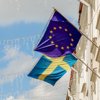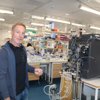-

New findings on the diseases that crushed Napoleon’s army
As if cold, starvation, and typhus weren’t enough. New research reveals that Napoleon’s defeated army also suffered from paratyphoid fever and relapsing fever during the retreat from Russia.
-

Svenska Novo Nordisk påverkas inte av massuppsägningarna
Ingen på Novo Nordisks svenska marknadsbolag berörs av de tidigare aviserade jättenedskärningarna i den danska koncernen, uppger bolaget för Life Science Sweden.
-

Cinclus inne på upploppet med ny fas III-studie – "Det känns jättekul"
Målet är storslaget – att ta fram en uppföljare till storsäljarna Losec och Nexium. Nu tar Cinclus Pharma nästa steg på vägen dit: den första patienten har rekryterats till bolagets fas III-studie i syrarelaterade sjukdomar.
-

Agreement in the EU on eight years of data exclusivity for new medicines
New pharmaceuticals will be covered by eight years of data exclusivity, according to the proposed new pharmaceutical legislation that EU countries have now agreed upon after prolonged negotiations.
-

Eli Lilly requests re-examination of Alzheimer's drug recommendation
Eli Lilly has requested that the EMA re-examine its opinion on the company's Alzheimer's drug, Kisunla, the agency announced on Friday.
-

Security flaw in Swedish breast cancer screening software – woman passed away
A lack of safeguard in Sectra's software led to a woman with breast cancer receiving an incorrect diagnosis. She later passed away. The software is used in 20 out of 21 regions in Sweden. It is also used in neighbouring Nordic countries. “Extremely serious,” says the Sectra CEO to Medtech Magazine.
-

First preterm infants study – a vital step for Neola
After years of developing an advanced lung monitoring system, Neola Medical has received some delightful news: permission to start its first clinical study on preterm born infants.
-

Marie Gårdmark: “What to expect from Trump’s second term?”
One may complain about the complex multinational system in EU, but it gives us some predictability that cannot be easily overturned by different member states political agendas, writes Marie Gårdmark in a column.
-

The business coach: “We need to learn from our mistakes”
The past year has been challenging for many biotech companies, with several comapanies facing financial stress and bankruptcy. To understand how entrepreneurs can navigate these tough times, Life Science Sweden spoke to Pia Keyser, a business coach at Umeå Biotech Incubator, who has worked with many companies in the industry.
-

Life science trends 2025 – Part 1 obesity drugs
More obesity drugs are being launched this year following Novo Nordisk and Eli Lilly's previous successes with GLP-1 drugs. But the next big breakthrough in obesity has a different mechanism of action, writes Samuel Lagercrantz in the first article in a series of trend insights for 2025. Today: obesity.
-

Medivir CEO on upcoming study: ”It's about working together with others”
Medivir is a small company with a big task: to take its drug candidate, via extensive clinical studies, all the way to a patient group that currently lacks approved treatment alternatives. "We can't do that on our own – our entire R&D activities are about working together with others," says the company's CEO Jens Lindberg.
-

Orbán's extended arm becomes health commissioner in the EU
Hungarian Olivér Várhelyi may soon become the most influential official for the healthcare and pharmaceutical industry in the EU. Várhelyi, who is close to Hungarian prime minister Viktor Orbán, is seen as a controversial figure due to his opposition to abortion and for calling EU members ”idiots.”
-

Roche’s Genentech terminates licencing deal with Norwegian biotech
Genentech is ending a license collaboration with Norwegian biotech Nykode Therapeutics regarding a clinical stage cancer vaccine program.
-

GSK pays 2.2 billion dollars to settle Zantac lawsuits
British drugmaker Glaxo Smith Kline, GSK, has struck a 2.2 billion dollar settlement, thereby resolving a vast majority of the liability cases pending against the company in the U.S. that alleged its discontinued drug Zantac caused cancer.
-

List: The coolest names in biotech
Hairy beasts, volcanic material and space strolling stand out on a US list of the best biotech company names, and on a list of the coolest names for pharmaceuticals, a Swedish, or at least Swedish-British, drug came out on top.
-

Lista: Coolaste namnen inom biotech
Håriga bestar, vulkaniskt material och månpromenader sticker ut på en amerikansk lista över de bästa företagsnamnen inom biotech. Och på en annan lista, över de coolaste namnen på läkemedel, blev det svenskt, eller åtminstone svensk-brittiskt, i toppen.
-

The art of building a biologic drug
The first biosimilar from Xbrane Biopharma was launched earlier this year, and several more are under development at the company’s facility in Solna, Sweden. “We do everything in-house ‒ from DNA fragments to a final process,” says David Vikström, Chief
-

Vd för life science-företag vinner entreprenörspris
Isabell Ahlén, vd för bolaget Sam Nordic, vann priset ”Entrepreneurial Winning Women” under årets regionfinal av Ey Entrepreneur Of The Year i Stockholm.
-

Uppsalabo vann postdok hos Astra Zeneca i internationell tävling
Nu står det klart att alla åtta finalister i Astra Zenecas tävling Postdoc Challenge tilldelas en postdoktors-tjänst hos läkemedelsföretaget. En av vinnarna är Uppsalabon Javier Aguirre Rivera.
-

Han kan vinna en postdok hos Astra Zeneca
På torsdag ska Uppsalabon Javier Aguirre Rivera presentera ett forskningsförslag i Cambridge inför en jury med förhoppningen om att vinna en betald postdok hos Astra Zeneca. Hans målsättning är att hjälpa till att effektivisera mRNA-baserade terapier till sjukdomar som idag inte har något botemedel.
-

From the sea of Åland to a self-test for lithium
Four years ago, a meeting on the sea of Åland resulted in the development of a self-test for lithium levels in the blood. The hopes are that the test will be available for individuals with bipolar disorder in the future.
-

Why the world renown researcher Marc Tessier-Lavigne resigns as Stanford´s president
In mid-summer, neuroscientist Marc Tessier-Lavigne announced his resignation as President of Stanford following allegations of manipulated study data. According to the reporter Theo Baker, who first reported the story, Tessier-Lavigne “rewarded the winners and punished the losers”. Here is the background of the story which has shaken the American scientific community over the summer.
-

Rapid developments in AI – “All stakeholders are struggling to understand it”
Artificial intelligence is being discussed more and more, and developments in the field are moving rapidly. As the Swedish Medical Products Agency testifies, keeping up with developments is not easy.
-

Vinnova is going to establish a new innovation cluster
Vinnova, the Swedish Agency for Innovation Systems, has been commissioned by the government to establish a national innovation cluster for advanced medicines.
Få tillgång till allt innehåll på Life Science Sweden
Ingen bindningstid eller kortinformation krävs
Redan prenumerant? Logga in
Gäller endast personlig prenumeration.
Kontakta oss för en företagslösning.